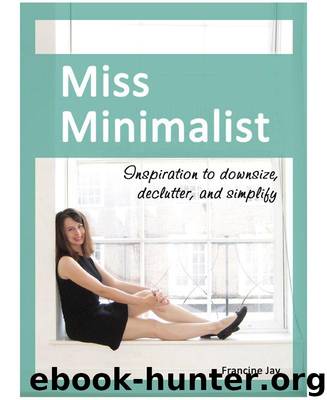Miss Minimalist: Inspiration to Downsize, Declutter, and Simplify by Jay Francine

Author:Jay, Francine [Jay, Francine]
Language: eng
Format: mobi, epub
Publisher: Anja Press
Published: 2011-05-24T16:00:00+00:00
37. One Less Thing: Perfume
An important part of being a minimalist is realizing what you can do without. It’s a continual process of discovering One Less Thing that—despite what peers, advertisements, or societal norms tell you—you just don’t need.
Several years ago, I discovered One Less Thing I could do without: perfume.
As a young girl, I associated those fancy glass bottles of fragrance with glamour, sophistication, and femininity—and was thrilled to receive my first one (the lemon-y Jean Naté—oh, the nostalgia!) as a birthday gift in junior high. I graduated onto the hipper Calvin Klein Eternity in high school, had a brief fling with Le De Givenchy during an Audrey Hepburn phase, and spritzed daily with Chanel Allure as an adult. (Yes, I’m girly like that.)
A perfume bottle was a standard fixture on my bathroom counter—that is, until I started learning more about what was inside.
You see, I’d always assumed perfumes were made of pretty things like flowers, sunshine, and rainbows. I’d never stopped to question exactly what was in the stuff I was spraying on my body. As naïve as it sounds, it came as a surprise to me that I was dousing myself with synthetic chemicals on a daily basis.
As it turns out, perfumes are full of potential hazards—and current laws don’t require companies to disclose them. Neurotoxins, hormone-disrupting chemicals called phthalates, and harmful synthetic musks are common ingredients. But because companies can claim fragrance as trade secrets, you won’t find them listed on the label. Worse yet, very few of the thousands of ingredients used in perfumes have been tested for human safety; their effects on the skin, the brain, the respiratory system, and other organs are simply unknown.
Well, that knowledge was enough to make me drop perfume (and other fragranced products, from shower gel to body lotion) from my beauty routine. To me, smelling like a rose was hardly worth the health risks.
Furthermore, I became concerned about the environmental impacts of perfume production and distribution. Ninety-five percent of the chemicals used in fragrances are petroleum-based compounds, and the manufacture of both the perfumes and their bottles consume a great deal of energy. Not to mention shipping them to shops and department stores around the globe!
It may seem a trivial topic, but fragrance is a multi-billion dollar industry. Walk down any high street in Europe, or into any mall in America, and you’ll see shelves piled high with designer potions; open up any magazine, or turn on any TV channel, and you’ll likely see an ad for the latest celebrity-endorsed scent. And it’s not just a female thing; men’s cologne commands a significant share of the market.
Yet, ironically enough, although such perfumes promise to make us more attractive to the opposite sex, research shows that our natural scents are more appealing.
So as a minsumer, I have to question: do we really want to waste our precious resources, our precious dollars—and possibly our precious health—on something we really don’t need?
For me, giving up perfume is a joyful act of consumer disobedience.
Download
Miss Minimalist: Inspiration to Downsize, Declutter, and Simplify by Jay Francine.epub
This site does not store any files on its server. We only index and link to content provided by other sites. Please contact the content providers to delete copyright contents if any and email us, we'll remove relevant links or contents immediately.
Professional Troublemaker by Luvvie Ajayi Jones(29648)
Whiskey Words & a Shovel I by r.h. Sin(19389)
Rewire Your Anxious Brain by Catherine M. Pittman(18642)
Healthy Aging For Dummies by Brent Agin & Sharon Perkins RN(17035)
Cat's cradle by Kurt Vonnegut(15331)
Talking to Strangers by Malcolm Gladwell(13344)
The Art of Thinking Clearly by Rolf Dobelli(10450)
They Both Die at the End by Adam Silvera(9806)
The 5 Love Languages: The Secret to Love That Lasts by Gary Chapman(9784)
Doing It: Let's Talk About Sex... by Hannah Witton(9275)
The Compound Effect by Darren Hardy(8941)
Thirteen Reasons Why by Jay Asher(8887)
Goodbye, Things by Fumio Sasaki(8575)
Wonder by R.J. Palacio(8569)
Tools of Titans by Timothy Ferriss(8363)
Atomic Habits: Tiny Changes, Remarkable Results by James Clear(8322)
Becoming Supernatural by Dr. Joe Dispenza(8199)
Wonder by R. J. Palacio(8097)
Change Your Questions, Change Your Life by Marilee Adams(7756)
